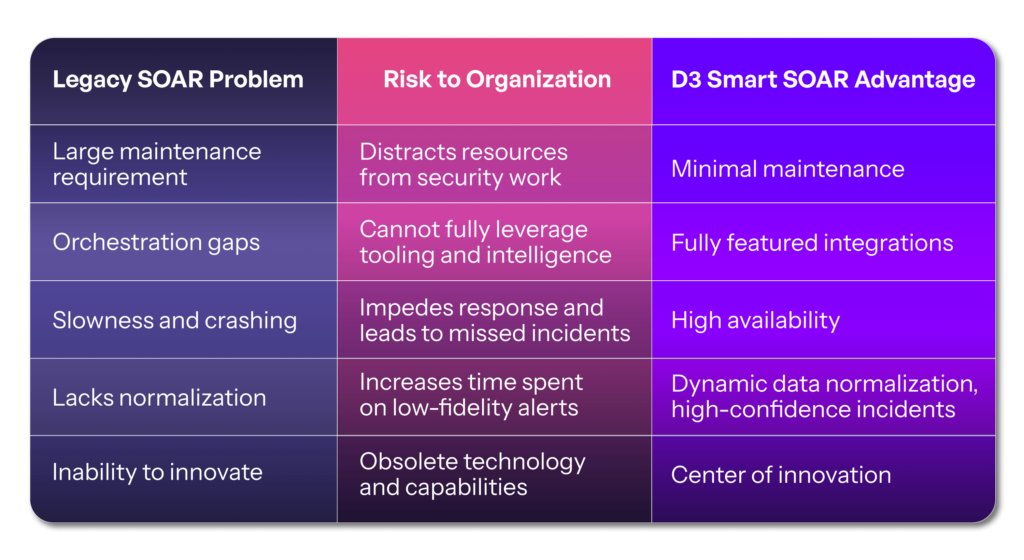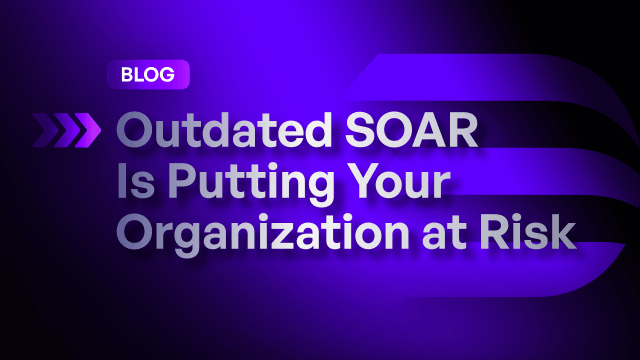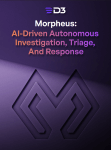Even if we think we are perfectly rational, our decision-making is heavily influenced by cognitive biases. One such bias is the status quo bias, which makes people tend to prefer their current situation over the idea of making a change.
Anyone who has made technology purchasing decisions knows the power of the status quo bias. You have a tool that is no longer meeting your needs, but the idea of replacing it seems riskier than sticking with it, so you keep it for years longer than you should.
Unfortunately, this is the situation that many Legacy SOAR buyers have found themselves in. The good news is that it isn’t as hard as you think to make the switch to a better solution. The bad news is that sticking with the status quo is probably putting you at more risk than you realize.
Risks Caused by Legacy SOAR
Why exactly does getting stuck with an outdated SOAR tool open your organization up to security risks? There are several reasons, including:
- Legacy SOAR takes a lot of work to maintain, which is time, effort, and resources you should be spending on defending your environment.
- Legacy SOAR has orchestration gaps due to poorly built integrations. Because Legacy SOAR vendors—or more often, the user communities that actually build many of their integrations—don’t have deep enough knowledge of the capabilities of YOUR unique cybersecurity stack, their integrations miss important data and limit response actions. These gaps make your team slower and less well-informed.
- Legacy SOAR is slow and has a habit of crashing. Countless times, security teams have told us about their Legacy SOAR crashing, which creates a backlog of events that makes it crash again when it’s back up and running. It can take days to clear up, which should scare any security pro. Not just for the operational downtime, but also for the potential of missed incidents.
- Legacy SOAR lacks a unified data model. Not having a tool that normalizes alert data and performs advanced correlations upon ingestion creates the risk of tying up your resources with tons of low-quality alerts while stealthy threats slip by uninvestigated.
As you can see from these examples, Legacy SOAR can compromise your security by wasting precious resources and obstructing your ability to clearly identify threats when they happen. The following table summarizes the risks alongside the alternatives provided by our Smart SOAR platform.

Why Legacy SOAR Can’t Solve Your Problems
To put it bluntly, Legacy SOAR vendors are no longer innovating. They’ve already fallen behind, and the security automation industry is rapidly moving on without them. You might think we’re exaggerating, because how could these vendors stay in business if they aren’t investing in making their products better? It’s because they aren’t really SOAR vendors at all. SOAR often represents a tiny fraction of their total revenue, so they have little reason to invest in it heavily.
Here at D3, we are obsessed with SOAR, so the best minds in our company are constantly hard at work improving our Smart SOAR platform. We are working on game-changing AI features—including natural language processing for search, case management, and even playbook building—and marrying them to our existing orchestration powerhouse.
Legacy SOAR isn’t even trying to keep up.
You Don’t Have to Live with the Risks
With the help of D3, you can modernize your entire incident response and investigation function, while making it agile, scalable, and high confidence—things that Legacy SOAR has proven it is not capable of doing.
To take the first step towards getting free from the risks of Legacy SOAR, here are three things you can do:
- Check out D3’s Legacy SOAR migration plans.
- Use our ROI calculator to see how much money you could save with more efficient automation.
- Get a fully customized overview of Smart SOAR.




